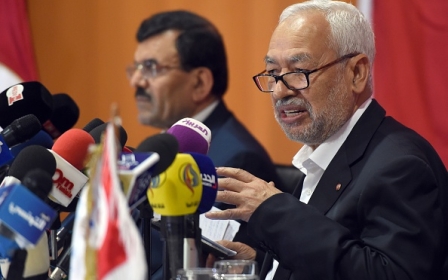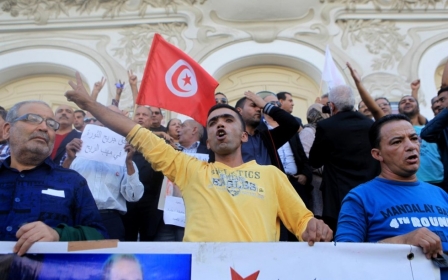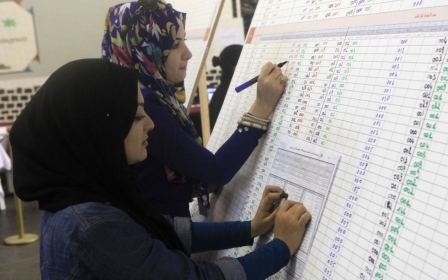Tunisian elections: A glimmer of hope in an ocean of political despair

Tunisia has voted for the second time in three years to elect its representatives to the National Assembly. In both cases, the vote was essentially an expression of opposition and protest. In 2011, electors, still invigorated by the ambient optimism of the Arab Spring, voted for a complete break with the previous regime. The political parties that best epitomised this political reversal (Ennahda, CPR) won the elections.
However, the current election marks a drastic change. Although this vote, like the one in 2011, was one of protest, the political atmosphere has been negatively charged, unlike 2011. The excitement and optimism of the first months of the revolution have been followed by the disappointment of three years of economic slowdown and political instability - punctuated by sporadic violence.
Whereas in 2011, there was a question of rebuilding the foundations of the republic, this time around regaining a sense of normality and security was the primary driver of voters’ choices. The 2011 election was characterised by political positioning and identity politics. In 2014, voters were more interested in a new political vision reinforced by concrete programmes.
Ennahda tried to market itself as the “party of consensus,” but Nidaa Tounes and Popular Front (Front Populaire) wanted to be seen as the main counter-force and political alternative to Ennahda. With the exception of Afek Tounes, no party has sought to capitalise on the quality of its political proposals and programs. Yet, the charisma and political acumen of political figures like the former president, Beji Caid Essebsi, and Ennahda’s leader, Rachid Ghannoushi, were a boon for the triumph of wisdom and common sense over passion and amateurism.
As the political communication specialist, Cyril Grislain Karray, aptly put it: “It should be noted that the present psychology of the Tunisian voter encourages him more naturally to vote "against” than vote “for.” People do not know exactly what they want, but they know what they do not want (violence, division, moral corruption...).”
By positioning itself as the antithesis of Ennahda, or more precisely, by highlighting the image of what Tunisia should look like as opposed to what it has become, Nidaa was able to propel itself to the forefront of the political scene. But Ennahda was able to maintain, nevertheless, the core of its electoral base due primarily to the coherence of its ideological positioning.
As the interim president of the republic and the secretary-general of the Democratic Forum for Labour and Liberties (known by its Arabic acronym “Attakatol”), Moncef Marzouki and Mustapha Ben Jaafar, respectively paid a heavy political prize for their association with the exercise of power during a difficult transition. It should be noted that Attakotol and the Congress for the Republic (CPR in French) headed by president Marzouki constituted, in addition to Ennahda, the ruling Troika in the period of transition. Therefore, the systematic identification of Attakatol and the Congress of the Republic (CPR in French) with their leaders was detrimental to those parties. Only Rachid Ghannouchi did not occupy an official position in the government.
As the political analyst Karim Guellaty contends: “[The] Tunisian legislative campaign is the perfect illustration of the principle of identification. The identification can take place in three ways: either by the leader, by the program or by [ideological] positioning.”
The pessimistic tone of voters notwithstanding, and the uncertainty of conjectures about the election, the elections were historic in many respects. Thus, one can infer a few important lessons from this unprecedented electoral contest.
- First of all, it is proven that there is a glimmer of hope, however small, in the largely desolate political landscape of the Arab world. For the first time in their history, Arab citizens had the freedom to debate, discuss and adopt a constitution that organises political life; a process that started with the free consent of the governed and peacefully ended with a coherent consensus among political actors….
-Discarding altogether the professional cadre of a former regime dispenses with two important elements absolutely necessary for the exercise of political authority and the management of administrative institutions: competence and experience. The de-Baathification process in Iraq was a case in point.
-The political acumen and compromise building skills of political figures like Rachid Ghannouchi and Beji Caid Essebsi were instrumental in overcoming ideological differences and thus enabling this moderately successful first experiment with democracy.
-Tunisia’s relatively weak army largely abstained from interference in the election. The Tunisian political class used the Army’s weakness to its advantage. Countries such as Egypt, Algeria, Pakistan, and Mauritania don’t enjoy this basic prerequisite to the functioning of institutional democracy.
-Last but not least, Tunisia’a relatively large and well educated middle-class highlights the importance to democracy of high literacy rate and limited social economic inequality.
Tunisian democracy is still in its infancy, but the political process is evolving in the right direction. There are still plenty of bumps in the long road to a full-fledged democracy. However, some crucial hurdles have been already overcome.
The Islamic party Ennahda has proven its capacity to comprise and thus was able to dispel the cliché oftentimes associated with Islamist political parties: one man, one vote, one time. And unlike the bloody and chaotic transition in Egypt, the political consensus that preceded the elections in Tunisia showed the importance of prioritising goals when establishing the institutional bases of a nascent democracy. Putting the cart before the horse was without a doubt the major blunder in the Egyptian case.
-Mohamed El Mokhtar Sidi Haiba is a social and political analyst, whose research interest is focused on African and Middle Eastern Affairs.
The views expressed in this article belong to the author and do not necessarily reflect the editorial policy of Middle East Eye.
Photo: Supporters of Nidaa Tounes gather in front of party building after the voting for Tunisia parliamentary election ends on 26 October, 2014 in Tunis, Tunisia (AA).
New MEE newsletter: Jerusalem Dispatch
Sign up to get the latest insights and analysis on Israel-Palestine, alongside Turkey Unpacked and other MEE newsletters
Middle East Eye delivers independent and unrivalled coverage and analysis of the Middle East, North Africa and beyond. To learn more about republishing this content and the associated fees, please fill out this form. More about MEE can be found here.





